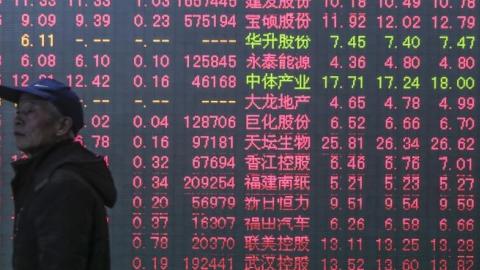If anyone has every participated in ‘scenario gaming’ of strategic hypotheticals, they will know that it can be a lot of fun. In the foreign policy and defence world, gaming became popular during the Cold War.
Questions such as what would happen if the Soviets invaded West Berlin or where would we end up if the US underestimated Russia’s second strike nuclear capacity and Moscow retaliated with a nuclear response, often led to terrifying conclusions -- or sometimes surprisingly upbeat ones.
The seriousness of the hypotheticals aside, they were fun and interesting because there was no right answer or predetermined outcome. The interest was in where the role playing expert participants would end up.
From early this century onwards, much of the scenario planning has been in response to a rising China: What might happen if Beijing acquires the capacity to inflict serious damage on an American aircraft carrier? How would Washington respond? What happens to the region if China reaches hard power parity with the US?
I am sure these and other more specific scenarios are being gamed as we speak.
With the burgeoning debate between China bulls and bears, let’s reverse the trend of scenario gaming beginning with the prospect of a rapidly rising China. Let’s instead assume that the bears are proven correct. The Chinese economy slows dramatically, triggered by a sudden halt in fixed investment growth which is the dominant driver of growth, credit slows and becomes much more expensive. Asset prices, especially real estate, begin to fall alarmingly. What happens then?
Given the brevity of this column, it is obviously not possible to comprehensively game what a dramatically slowing China might mean in strategic terms. But let’s begin the conversation and leave the conclusion to more able minds with some spare time. The starting point is that any dramatic slowdown will have a significant impact on Chinese national power and capabilities. This is the case for a number of reasons.
One is that any slowdown will have a disproportionately high impact on state-owned enterprises, since SOEs are the major drivers of fixed investment and fixed-investment growth in the country. Moreover, a drop in fixed-asset investment would not just affect construction companies since all major SOEs have substantial cross investments in fixed investment sectors. Any fall in capital asset prices would have a large impact on the balance sheets and profitability of SOEs and thus the tax revenue collected by Beijing.
Given that SOEs make a disproportionately high contribution to the fiscal revenue of the central government, and that around 15 per cent of the central budget is spent on national security (8.8 per cent on the PLA and 5.8 per cent on the People’s Armed Police which deals with internal security), the subsequent impact on the military budget would be considerable.
The problem would be further exacerbated by the high likelihood that a tightening of credit markets, the increased cost of credit and the resulting falls in capital asset values will have a severe impact on the balance sheets of tens of thousands of provincial and local government SOEs -- thousands of which are already under severe debt stress and are reliant on cheap credit and high asset valuations to remain solvent. Many provincial and local governments have become fiscally reliant on these ‘financing vehicles’ -- essentially SOEs -- and any fiscal shortfall will ultimately be met by the central government.
Another reason is that enhancing innovation and industrial capacity pertaining to state and national power is outsourced largely to state-backed ‘national champions’. These national champions are offered enormous resources from the central budget and have access to cheap credit from the state-controlled banking system. A dramatic tightening of fiscal revenues and tightening of credit markets will have clear adverse consequences for state-backed industrial policy and subsequently the development of Chinese national power.
The possible impacts of pressure on Beijing’s military budget will be significant given that the People’s Liberation Army (PLA) has become accustomed to annual budgets growing at double-digit rates. For example, smaller military budgets will undoubtedly increase opportunity costs since it becomes more difficult to simply throw more resources into areas where China is seeking to gain a future advantage and at the same time fund areas where gaps or shortcomings exist. Traditionally, a continental (land-based) military power, China is pouring money into becoming a formidable naval power in record time. What would a budget squeeze do to its naval ambition if the budget increases routinely sought by the PLA Navy is consistently knocked back?
Then think about some of the economic consequences that might have strategic implications. Should there be a dramatic slowdown in the Chinese economy, it is highly likely that Beijing will adopt a number of policies that will increase the competitiveness of export manufacturing as a response to declining fixed-asset investment. This might include further currency suppression (relative to consumer market currencies such as the US dollar and the euro) and additional tax and regulatory concessions to export manufacturers. The net effect of such policies is likely to come at the expense of other low-middle income East Asian economies all competing for a larger share of processing trade production with end products ultimately destined for the huge advanced economy markets in North America and the European Union. This will undoubtedly create further economic tension with neighbours.
Additionally, a loss of faith in the prospect that China will become a new net consumption economy of significant size that can create game-changing new market opportunities for East Asian neighbours may well alter the hedging and balancing behaviours of neighbours. Currently, China has managed to use the prospect of the future opportunities created by its expanding economy for current leverage. Even though America remains the preferred security partner of almost all countries in the region, very few countries are openly balancing against China and are instead merely hedging against China’s rise (by encouraging and facilitating an American presence).
In this scenario, there may well be significantly greater willingness by East Asian countries to more actively balance against a weakening China. Organisations like ASEAN may be more willing to take a collectively stronger diplomatic stance against Chinese assertiveness over claims in the South China Sea. China will remain respected but will no longer be feared to the same extent.
Then think about ramifications for the Chinese Communist Party. Who are the likely new economic and political winners and losers? Will President Xi Jinping’s already considerable authority be enhanced or degraded? This is important because it is widely accepted that President Xi has overseen an increasingly proactive but calculated change in Chinese policy over issues such as maritime claims in the region and is increasingly advocating for a reduced American strategic role in the region. A related question is how a President with diminished authority might respond -- whether there will be increased pressure on the President to be more or less compromising and risk averse when it comes to various foreign policy issues and responses in the region.
Much of China’s state media, and influential internet and social media actors, tend to take a much less temperate view of the national interest when responding to perceived national slights. Will actors like these become more or less influential?
What about the question of whether increasingly powerful SOEs will gain or decline in economic and therefore political influence. In recent economic crises, Beijing responded with policies that enhanced rather than weakened the role of SOEs in the economy, a trend that had been in existence since early this century. This is important because SOEs have become influential and increasingly trenchant over areas such as energy policy, which has ramifications for China’s stance with countries such as Iran and in the reportedly resource-rich South China Sea.
On the other hand, a weakened SOE sector accompanied by a relatively more influential domestic private sector -- seen as a potential antidote for China’s economic problems -- may well change not only China’s economic model but its political and policy environment. The domestic private sectors, supported generally by Chinese economic reformers and reforming institutions such as its central bank, tend to favour greater economic cooperation with East Asia and advanced American and European partners, and the opening of markets and lessening of SOE privilege and protection. Those advocating such policies also tend to emphasise the benefits of reducing tensions and a more cooperative approach to political and strategic relations with America and American allies in East Asia.
I am sure readers will think of other factors to consider, and different lines of reasoning. The point is much time and column inches have been spent on what a strong China might mean for the region, and rightly so. But it is also time to consider what a faltering Chinese economic power might look like and mean for the region.
















